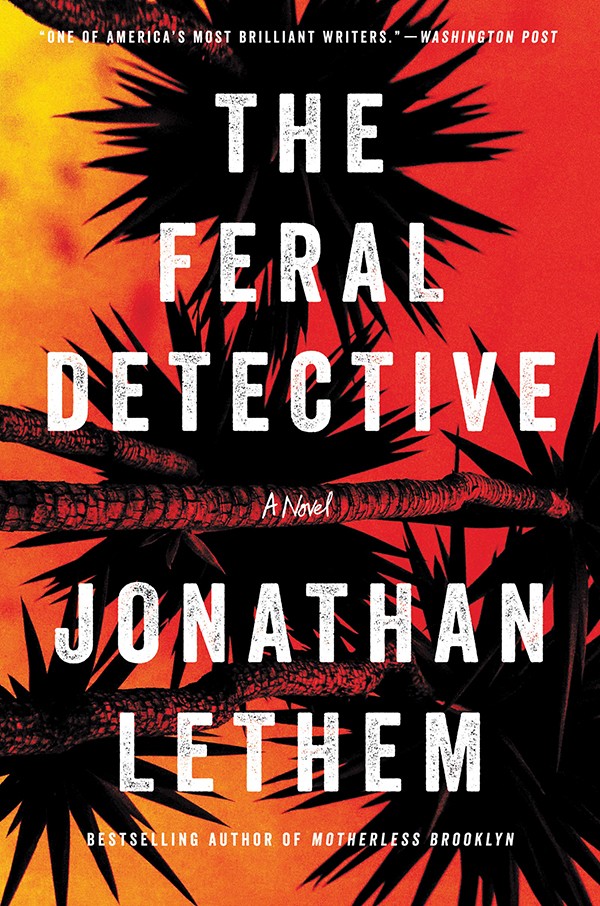Jonathan Lethem is one of our most versatile writers. From his early sci-fi novels to his National Book Critics Circle Award-winning Motherless Brooklyn and his The Fortress of Solitude, his restless imagination has never settled; he’s not written the same book twice.
This new novel, The Feral Detective, belongs to what you might call the smart-ass noir subgenre, novels that use the tropes of the detective story with heartfelt respect, leavened by a wink to the audience. Other writers who have done this include Thomas Pynchon, Thomas Berger, and William Kotzwinkle. Lethem can make with the hardboiled patter: “That coffee was a wiper blade, cutting a window for my brain to peer through.”

The first-person narrative comes via Phoebe Siegler, who seeks out the titular detective, Charles Heist, to help her find a friend’s daughter, Arabella, who has disappeared, either kidnapped or a runaway. It’s as if Brigid O’Shaughnessy is telling the tale of The Maltese Falcon and Sam Spade is a secondary character. It’s an interesting set-up, made believable by Lethem’s ability to take on a female character’s voice. Plus, this story takes place just after Trump has won the election, and that colors everything that happens, casting an irreal, dark penumbra over events already bleak and daunting. Phoebe fantasizes about her adventure and then says, “That such thinking was fucking insane didn’t make it less consoling. We lived in a fucking insane world. Such thinking might be the right gear for my expedition through it.”
Charles Heist, Private Investigator, never really solidifies for the reader, partly because Phoebe can’t get a handle on him, and it’s her story. He seems like the Marlboro Man who’s read Nietzsche and Reich and Camus, an unlikely hero for an incongruous time. We’re not given much of him because he speaks little. Sometimes he seems like only a reflection of our narrator’s romantic leanings, or the hero she believes she needs when she really only needs herself.
Phoebe thinks that Arabella may have gone in pursuit of Leonard Cohen’s ghost, so the search for the missing girl begins with a trip up Mount Baldy, where Cohen studied Buddhism under his spiritual guide Roshi. Eventually, their exploration takes them into the Mojave Desert and into a survivalist cult that is in the midst of a civil war between Bears (mostly men) and Rabbits (mostly women). Partly, Phoebe takes up this idealistic expedition out of despair and depression engendered by the squatter in the White House. Out of the nation’s miasma she is trying to find something that makes sense, and rescuing a friend’s daughter from bad guys seems to have sincere meaning for her.
Phoebe falls hard for the laconic Heist, and she loses sight of the prize as she begins an affair with the detective. This complicates their dangerous, desert sojourn, and the original case becomes something else, something more personal and, hence, thornier. “I felt closer than ever to Heist,” she says. “We had different styles. I made myself candid in fickle bursts, he reciprocated with marathon ruminations or silence. He’d led me into his desert.” Here, Heist becomes even more of a wavering mirage, flickering into view because of Phoebe’s reheated passion.
For a while, their target is the leader of the Bears, a mountain of a man, who goes by the moniker of Solitary Love. (“Crazy-ass Love’ll never be brought down alive, and to kill him outright might require a bazooka.”) But this is a quest with numerous hairpin turns. What is sought keeps changing as the story mutates and zigzags.
The denouement of this rollicking, sometimes absurd tale is a wild ride through perilous territory. It’s like The Rockford Files crossed with a Pynchonian search for something numinous. It’s also occasionally very funny. Lethem keeps the Mad Max action in the forefront and the philosophy as backwash. We care what happens because Phoebe is believable, appealing, and endearing. Ultimately, Lethem proves that the phrase “literary page-turner” is not an oxymoron.